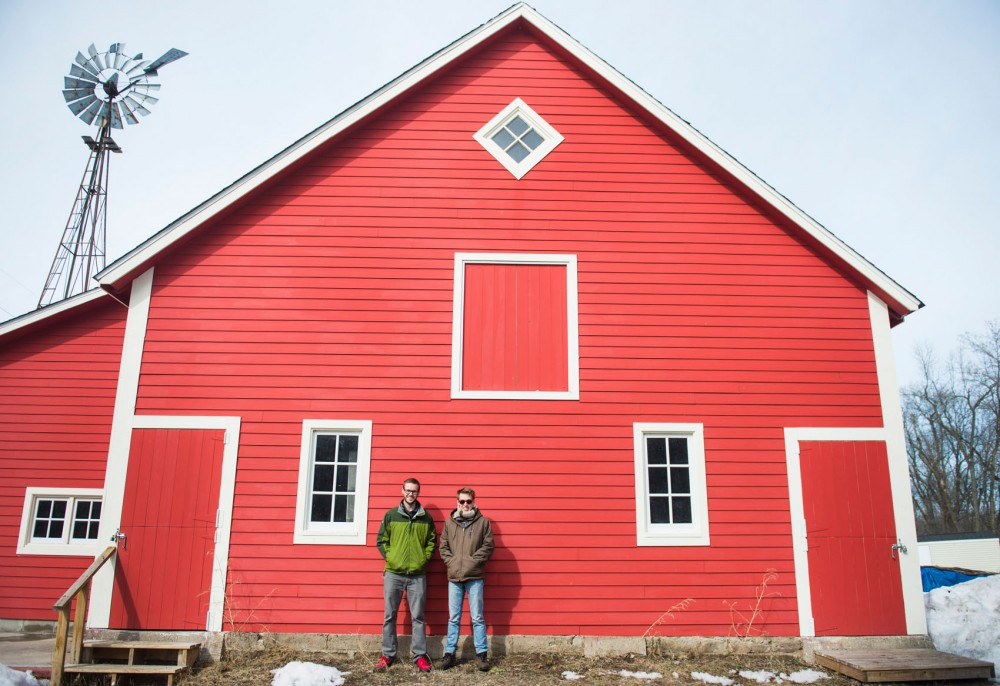A foot of hard snow clings to the more than 70 acres of land at the Sannerud family farm in Ham Lake, Minn., where other farmers have planted corn and mushrooms and laid out compost.
For three generations, the Sannerud family has rented its land to others rather than tending it themselves, but that will change soon.
University of Minnesota alumnus Eric Sannerud and two other University students will turn a chunk of that land into Mighty Axe Hops. Their new project will farm local, organic and sustainable hops, filling a growing demand from the state’s booming craft brewing industry.
“Duh, there’s a market,” Sannerud said. “People want craft breweries, and they’re going to want local hops.”
There are 47 companies registered in the Minnesota Craft Brewers Guild, and the majority of them are based in the Twin Cities. And that doesn’t include breweries just beginning to establish themselves, such as Fair State Brewing Cooperative and the Day Block Brewing Company, which both operate out of Minneapolis.
Horticulture senior Ben Boo is in charge of designing and developing the cropping system for Mighty Axe. He said most hops come from the West Coast, where the weather is more temperate. But he said he believes plenty of breeds, like Cascade hops, will grow here despite the harsh winters and hot summers.
“It’s not as perfect as, like, Oregon or Washington, but it does just fine,” Boo said. “We’re picking plants that’ll do well in Minnesota.”
Boo said a huge part of their plan is to farm the hops organically, meaning they wouldn’t use any pesticides or fungicides to manage the crops, which he said has become common practice in hops farming.
“There’s absolutely no question for the demand [for hops] being there,” said Niko Tonks, head brewer for Fair State Brewing Cooperative. “It’s next to impossible for brewers to get hops that are grown in Minnesota.”
Starting last year, the U.S. Department of Agriculture required organically certified beers to use only organic hops, which Tonks said makes finding organic hops particularly difficult right now. He said the fact that he’ll now be able to buy hops that are both local and organic excites him.
Mighty Axe grew 25 hop plants as a trial run last summer, which successfully yielded roughly 7 ounces of hops, Sannerud said.
They donated the hops to Fairstate Brewing Cooperative, which brewed them into six barrels of India Pale Ale. That batch sold out in just four hours, Sannerud said.
“It was a complete zoo,” he said. “There was a line out the door.”
By the end of this August, he said, Mighty Axe hopes to be able to produce 20 pounds of hops.
This early success was one reason the team took first place at the Acara Challenge this year, said Institute on the Environment assistant director Brian Bell. The institute holds the venture competition every year with the aim of supporting start-ups that provide sustainable solutions to environmental issues.
Bell said Mighty Axe won $1,000 to help fund a project’s initial costs. Mighty Axe is also eligible to receive an additional $5,000 at the end of March.
Mighty Axe CFO Brian Krohn said the company plans to put all its money into its first crop for now, so it can yield as much as possible and establish permanent partnerships with smaller local breweries. Eventually, Mighty Axe hopes to develop agreements with larger, more-established breweries like Fulton, he said.
Sannerud said their goal is to produce 6,000 pounds of hops a year on four acres of land by 2016 — only a fraction of the total acreage at the farm. But Boo said keeping their operation small has its benefits because they’ll be able to better manage their crops without having to spray pesticides.
“Because we’re on a small scale, it’s easier to be more in tune with the land,” he said. “You can hands-on take care of problems.”








